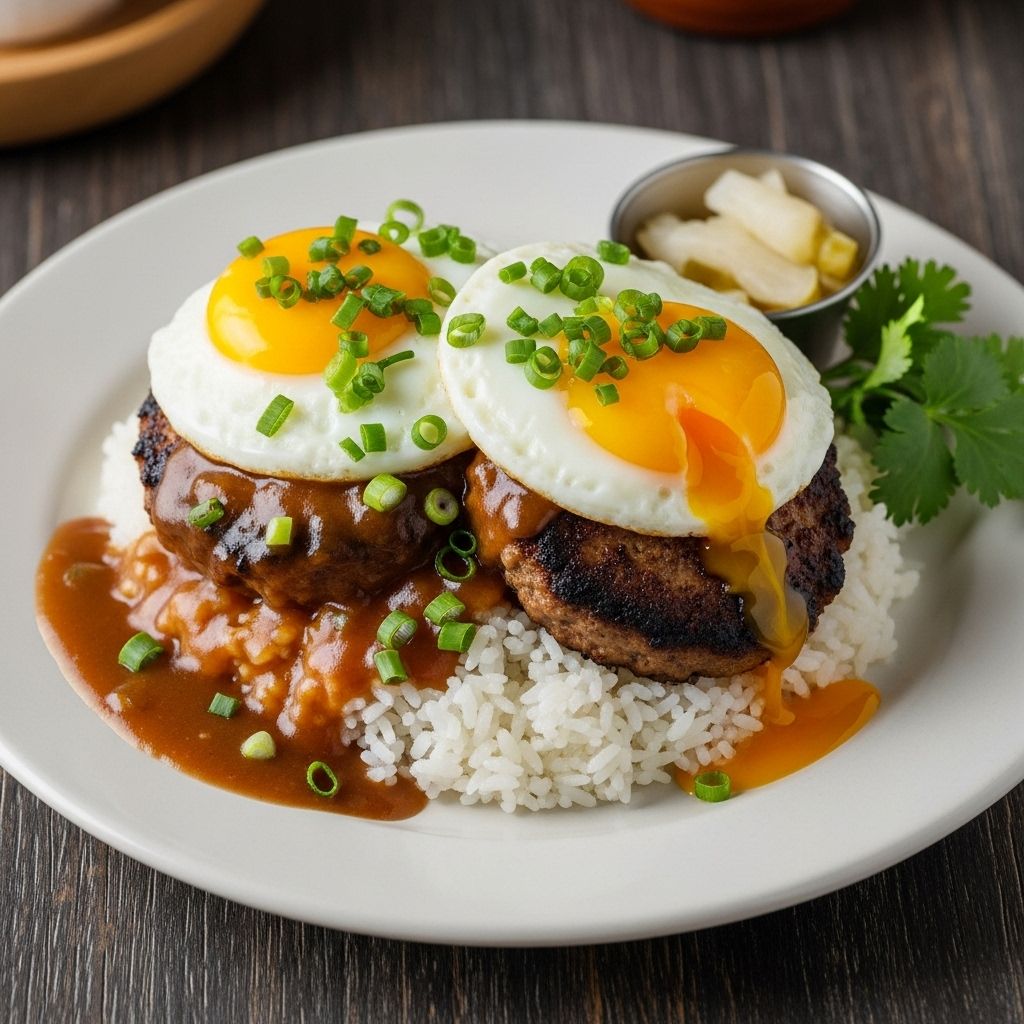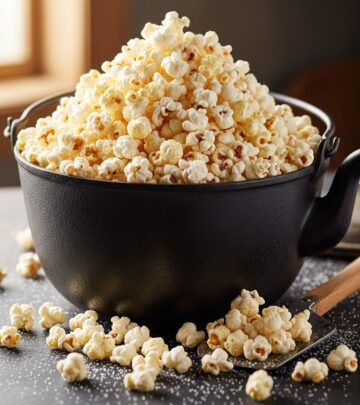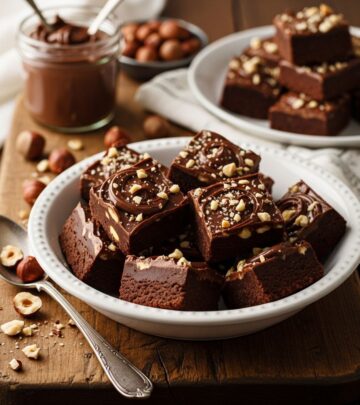Loco Moco: Hawaii’s Iconic Comfort Food, History, and Recipe Guide
A homestyle meal born from resourceful cooks, delivering savory satisfaction in every bite.

When it comes to comfort food that delivers savory satisfaction and a deep sense of place, few dishes stand as distinctly Hawaiian as loco moco. With layers of fluffy rice, a juicy hamburger patty, rich brown gravy, and a perfectly cooked egg, loco moco is a hearty bowl layered with the multicultural history of the islands. Whether you’re new to Hawaiian cooking or a homesick local looking for a taste of home, this comprehensive guide will walk you through the fascinating background, varied versions, and step-by-step mastery of this beloved dish.
What Is Loco Moco?
Loco moco is a savory rice bowl built around four key elements:
- A foundation of steamed white rice
- A seasoned hamburger patty (occasionally swapped for alternatives like fried chicken, teriyaki beef, or Spam)
- Brown gravy (sometimes with mushrooms or onions)
- A just-cooked fried egg, typically sunny side up or over easy
The result is a crave-worthy, deeply satisfying meal commonly enjoyed for breakfast, lunch, or dinner—whenever hearty comfort food calls.
Loco Moco Origins and History
Like many iconic Hawaiian foods, loco moco tells a story of humble beginnings, resourcefulness, and cultural intermingling. The dish was created in Hilo, on Hawaii’s Big Island, in the late 1940s at the Lincoln Grill diner. According to legend, a group of local teenagers from the Lincoln Wreckers Sports Club asked the owners, Richard and Nancy Inouye, for something cheap, quick, and filling, different from the usual sandwich or American fare. The answer was a scoop of rice, topped with a hamburger patty, and covered in brown gravy. The fried egg was added shortly after. The quirky name—”loco moco”—was invented on the spot, a playful fusion of the Spanish word for “crazy” and a rhyming flourish.
Loco Moco as Hawaiian Plate Lunch
Loco moco perfectly embodies the spirit of the Hawaiian plate lunch: an all-in-one meal bringing together diverse immigrant influences. The dish combines American hamburger traditions, Japanese and Chinese staples like rice, and a pan-Asian love for rich gravies. It’s an example of Hawaii’s multicultural foodways and the ingenuity of local cooks making the most with limited means.
Essential Loco Moco Ingredients
One beauty of loco moco is its accessibility: you can make it with ingredients common to most kitchens, and each household adds its own flair. Here’s a breakdown of the basics and suggested add-ons:
- Rice: Short-grain or medium-grain white rice is preferred for its stickiness, but any steamed rice works.
- Beef Patty: Seasoned ground beef, shaped thick so it stays juicy.
- Gravy: A classic brown gravy made from beef stock, sometimes with mushrooms and onions for added depth.
- Egg: Fried sunny-side up or over easy, ensuring a runny yolk soaks into the rice below.
- Garnish (optional): Sliced green onions, fried crispy onions, or even a dash of chili pepper water or hot sauce.
How to Make Loco Moco: Step-by-Step Guide
Follow these clear steps to craft an authentic loco moco at home. This recipe serves 4, but can easily be doubled or halved as needed.
Ingredients
- 2 cups uncooked short-grain or medium-grain white rice (about 4 cups cooked)
- 1 1/2 pounds ground beef (ideally 80/20 for juiciness)
- 1/2 small sweet onion, minced (optional for patties)
- 2 cloves garlic, minced
- 2 tablespoons soy sauce
- 2 teaspoons Worcestershire sauce
- 1 tablespoon oil (for frying)
- 8 ounces cremini or button mushrooms, sliced (optional for the gravy)
- 3 tablespoons all-purpose flour
- 2 cups beef stock
- 4 large eggs
- Sliced green onions (for garnish, optional)
- Salt and freshly ground black pepper
Optional Ingredient Variations
- Ketchup or cornstarch: Some recipes add a spoonful of ketchup for tang or cornstarch in place of flour to thicken the gravy.
- Butter: Adds richness to the gravy or for frying eggs.
- Additional seasonings: Garlic powder, onion powder, or a pinch of MSG for umami.
- Alternative meats: Swap classic beef with fried chicken, Spam, Portuguese sausage, or even tofu for a creative twist.
Equipment Needed
- Large skillet or frying pan (preferably nonstick or cast iron)
- Saucepan (for rice)
- Mixing bowls
- Spatula and whisk
Step-by-Step Method
1. Cook the Rice
- Rinse 2 cups of short- or medium-grain rice until water runs mostly clear.
- Combine in a pot with 2 1/2 cups of water and a pinch of salt, if desired.
- Bring to boil, cover, lower heat, and simmer for 15 minutes.
- Remove from heat and let rest, covered, for 10 additional minutes. Fluff, then keep warm.
2. Shape and Cook the Beef Patties
- In a mixing bowl, combine ground beef, minced onion, garlic, soy sauce, Worcestershire, salt, and pepper.
- Gently mix together until just incorporated. Do not over-mix.
- Form into 4 large, thick patties (about 3/4 inch thick). Make a small indentation in the center to prevent puffing during cooking.
- Heat oil in skillet over medium-high heat.
- Add patties and cook until deeply browned and just cooked through, about 3–4 minutes per side.
- Transfer to plate and keep warm. Drain excess fat, reserving about 1 tablespoon in the pan for gravy.
3. Make the Brown Gravy
- Add sliced mushrooms to the same skillet (if using) and cook until browned, about 3 minutes.
- Stir in flour and cook, stirring, for 1 minute to make a roux. The mixture will become pasty and lightly golden.
- Gradually whisk in beef stock, scraping up any fond (browned bits) from the pan’s bottom.
- Season with additional soy sauce and Worcestershire, and add black pepper to taste.
- Simmer until thickened to a pourable gravy, about 3–4 minutes.
- Return cooked patties to the pan to quickly warm through in the gravy, then set aside.
4. Fry the Eggs
- In a clean skillet, heat a little oil or butter over medium heat.
- Crack eggs and fry until whites are set but yolks remain runny (sunny side up or over easy).
- Season with salt and pepper.
5. Assemble the Loco Moco
- Scoop a generous portion of hot steamed rice into a shallow bowl or plate.
- Top with one beef patty.
- Ladle a hearty portion of brown gravy over the patty and rice.
- Set a fried egg on top, letting the yolk just begin to mingle with the gravy below.
- Garnish with sliced green onions if desired. Serve immediately, inviting diners to break the yolk and mix everything together.
Expert Tips for the Best Loco Moco
- Use day-old rice for the best texture—it’s slightly drier and soaks up gravy beautifully.
- Don’t overwork the beef mixture; gentle mixing keeps patties tender.
- Let your beef patties rest after cooking so juices redistribute.
- Whisk gravy constantly to avoid lumps. If the gravy is too thick, add extra stock; if too thin, keep simmering or add a cornstarch slurry.
- Mushrooms and caramelized onions add extra depth, but aren’t mandatory.
Popular Loco Moco Variations
- Chicken Katsu Loco Moco: Swap the beef patty for a crispy breaded chicken cutlet.
- Spam Loco Moco: A beloved Hawaiian twist using slices of grilled Spam in place of hamburger.
- Fish Loco Moco: Use grilled fish, such as mahimahi, for a lighter version.
- Vegan Loco Moco: Use a plant-based patty and vegan gravy; top with a tofu “egg” or sauteed mushrooms.
- Loaded Loco Moco: Add macaroni salad, kimchi, or pickled vegetables on the side for the full Hawaiian plate lunch experience.
Loco Moco’s Place in Hawaiian Culture
More than just a meal, loco moco embodies the spirit of Hawaiian resourcefulness. Born from necessity and local innovation, the dish remains a mainstay at diners, lunch counters, family gatherings, and festivals. Its popularity has spread far beyond the islands, celebrated from Los Angeles to Japan as an emblematic taste of Hawaii. For many, sharing loco moco is a symbol of hospitality, comfort, and community—deeply rooted in both everyday life and nostalgic memories of home.
Troubleshooting: Common Problems and Solutions
| Issue | Solution |
|---|---|
| Gravy is lumpy | Strain through a fine-mesh sieve and whisk vigorously |
| Gravy too thin | Add more flour or a cornstarch slurry, and simmer gently |
| Gravy too thick | Whisk in extra beef stock slowly until desired consistency |
| Patties are tough | Handle the beef gently and don’t overcook |
| Eggs overcooked | Watch closely and remove from skillet just as whites set |
Serving and Presentation Tips
- Serve loco moco piping hot for the best eating experience.
- Accompany with classic plate lunch sides: macaroni salad, pickled vegetables, or a simple green salad.
- Add hot sauce or sriracha for extra kick.
- Garnish with microgreens, furikake (Japanese rice seasoning), or crispy fried onions for a contemporary twist.
Frequently Asked Questions (FAQs)
Can I make loco moco ahead of time?
While loco moco is best served fresh—especially for the runny yolk and crisped beef patty—you can cook the rice and patties in advance. Gravy can also be made ahead and reheated. Fry the eggs just before serving for optimal texture.
Can I freeze loco moco components?
Beef patties and gravy freeze well for up to 2 months. Thaw and reheat gently. Rice and eggs are best prepared fresh, as freezing can change their textures.
How can I make this dish gluten free?
Use gluten-free soy sauce (tamari) and thicken the gravy with cornstarch or a gluten-free flour blend.
Is there a healthier version of loco moco?
Absolutely! Use leaner ground beef or ground turkey, brown rice or cauliflower rice, and top with a poached egg instead of a fried egg. You can also add sautéed greens.
Final Thoughts
Loco moco remains one of Hawaii’s most cherished comfort foods, bridging the islands’ complex history and love for hearty, affordable meals. With its endless adaptability and crowd-pleasing appeal, mastering loco moco at home is both a celebration of tradition and an invitation to personalize this island classic for your own tastes and table.
References
Read full bio of Sneha Tete












